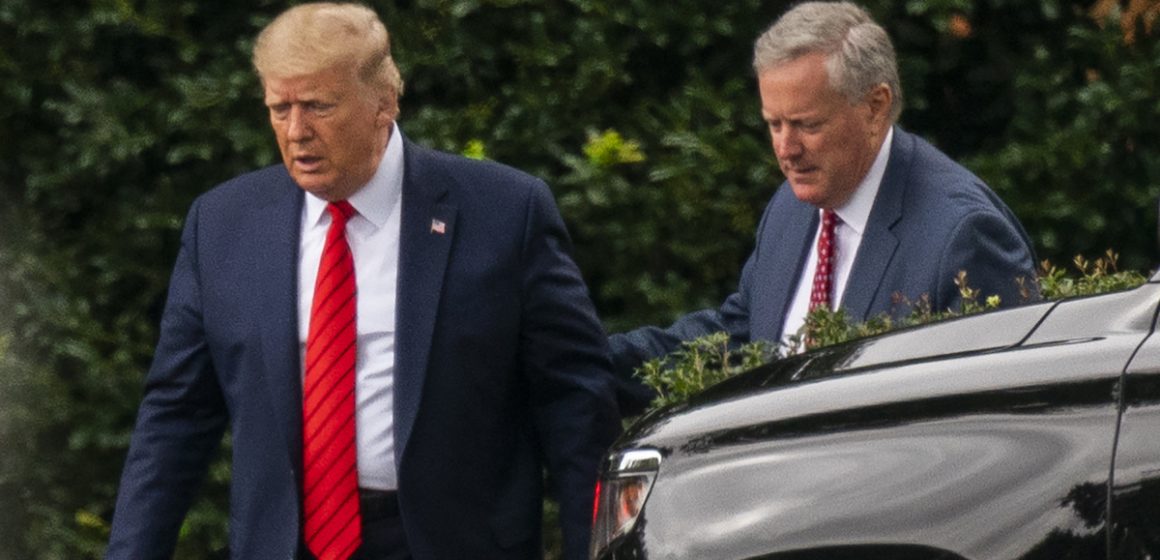The U.S. Supreme Court on Tuesday denied certiorari to former Trump White House chief of staff Mark Meadows in his long-running bid to move his Georgia racketeering (RICO) prosecution to federal court.
In a slim, 5-page orders list, the nation’s high court listed the denial among dozens of others. Oftentimes, a small number of denied cases will feature a brief elaboration. That did not happen in Meadows’ case.
Without a word of explanation, the nine justices declined to grant a hearing in the matter — affirming decisions issued by the U.S. Court of Appeals for the 11th Circuit last December and February of this year.
The high court’s rejection, however, was not necessarily a foregone conclusion — and the move even surprised some legal experts.
“I’m surprised because the appeals court had ruled [the] federal removal statute can’t be invoked by a defendant who is no longer a federal officer even though he was one at time of alleged crime,” Lawfare editor Roger Parloff posted on X (formerly Twitter). “No other court had so held in 190 [years] of the law’s existence.”
In July, Meadows offered an argument that has been fairly convincing in other circuits: that the removal statute can be used to take a case out of state court (and put it in federal court) if the person criminally charged was a federal officer at the time of the alleged crime.
But the appeals court twice rejected this iteration of the legal doctrine — once on the merits; for the second time on a request for a rehearing before the full 11th Circuit which did not go to the merits at all.
The heart of the opinion rejecting his removal effort was the notion that the federal removal statute “does not apply to former officers” of the United States “so Meadows, as a former chief of staff, is not a federal ‘officer’ within the meaning of the removal statute.”
Meadows rejected this understanding of the removal statute:
“Denying former officers removal protection by focusing on officer status at the time the prosecutor or plaintiff decides to file suit, rather than when actions under color of federal office occurred, is unprecedented for a reason,” the petition goes on. “What matters is a federal officer’s status at the time of the conduct at issue, not her status at the time the prosecutor or plaintiff gets around to filing suit.”
More Law&Crime coverage: ‘Entirely omits relevant precedent’: Fani Willis tells Supreme Court to keep Mark Meadows RICO case in state court
In a widely-known, and serially delayed, prosecution, Fulton County District Attorney Fani Willis secured a lengthy RICO indictment against former-and-forthcoming President Donald Trump, along with numerous other defendants; Meadows one among them.
Since then, the case has been whittled down for several defendants — including Meadows — when the trial court in the criminal case dismissed several counts because prosecutors failed to include enough information in the indictment.
The former White House staffer only faces a lone charge in Georgia: the overarching alleged RICO conspiracy.
For now, at least, that charge remains.
But the rejection of Meadows’ petition is unlikely to result in any progress in the underlying case anytime soon.
More Law&Crime coverage: ‘Not a get-out-of-state-court-free card’: Mark Meadows’ failure to remove Georgia RICO case to federal court comes back to haunt Jeffrey Clark, too
The Georgia RICO case itself, of course, is currently and completely paused as a Peach State court of appeals considers several issues related to the ongoing, semi-successful effort to have Willis and her entire office disqualified from the case — or have the case thrown out altogether.
Still, there is a practical upshot to the nation’s high court dispensing with the Meadows petition in the manner it did.
As Lawfare editor Anna Bower notes on X, the “novel” interpretation of the federal officer removal statute is, at least for the foreseeable future, the law of the land in Alabama, Florida, and Georgia.
Have a tip we should know? [email protected]
Note: Thank you for visiting our website! We strive to keep you informed with the latest updates based on expected timelines, although please note that we are not affiliated with any official bodies. Our team is committed to ensuring accuracy and transparency in our reporting, verifying all information before publication. We aim to bring you reliable news, and if you have any questions or concerns about our content, feel free to reach out to us via email. We appreciate your trust and support!


